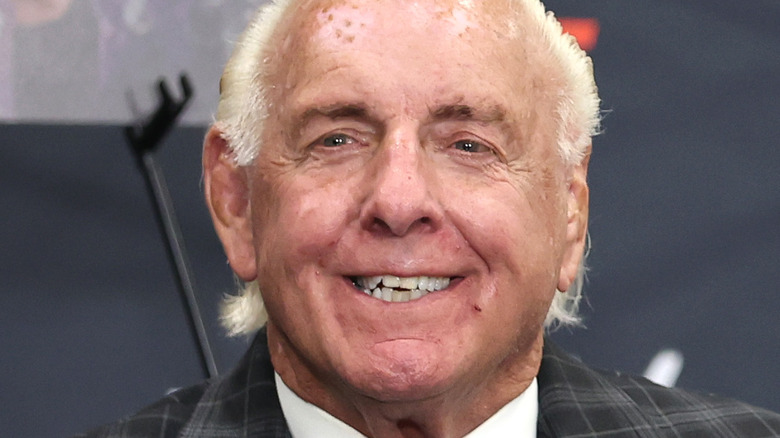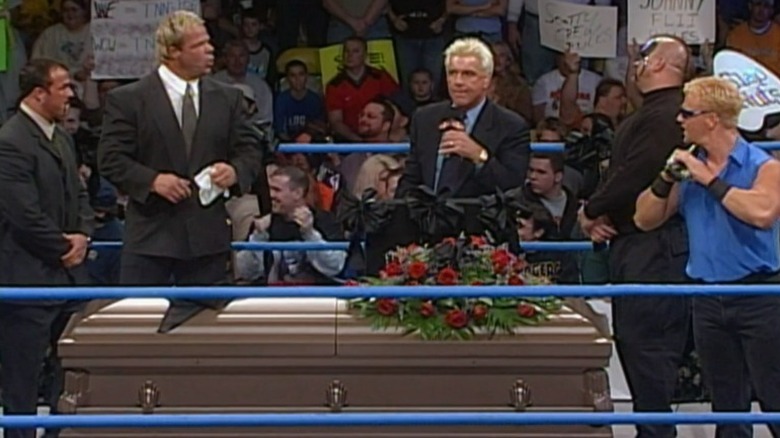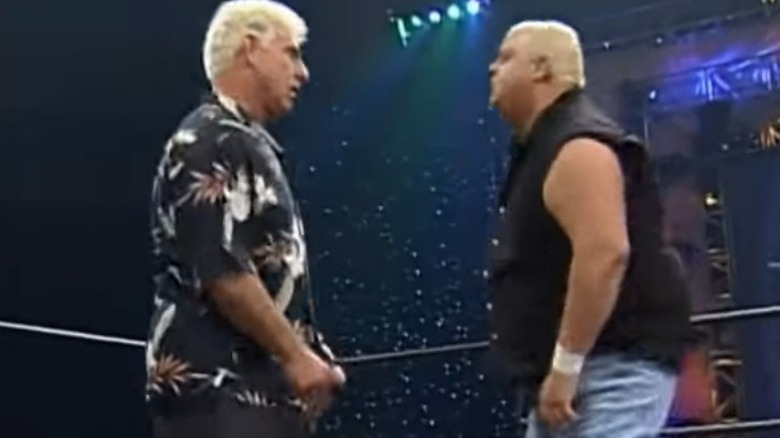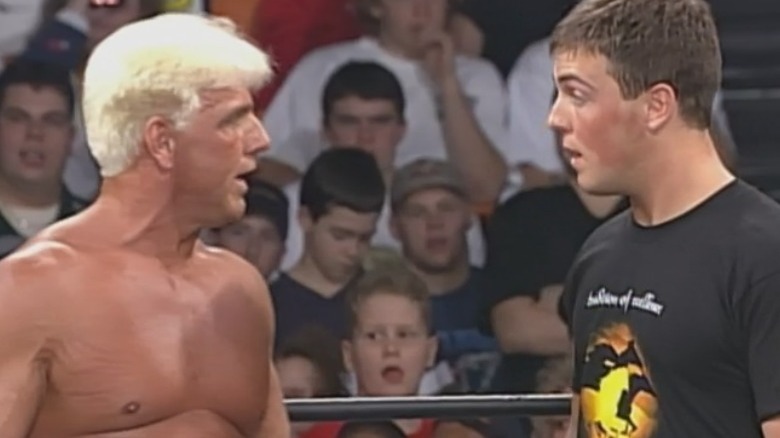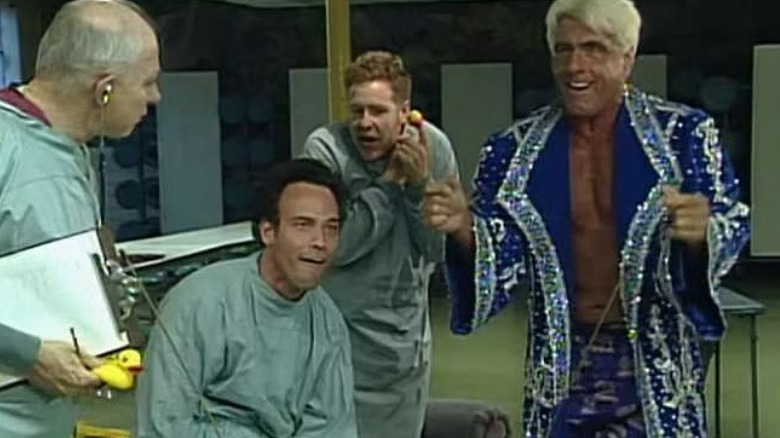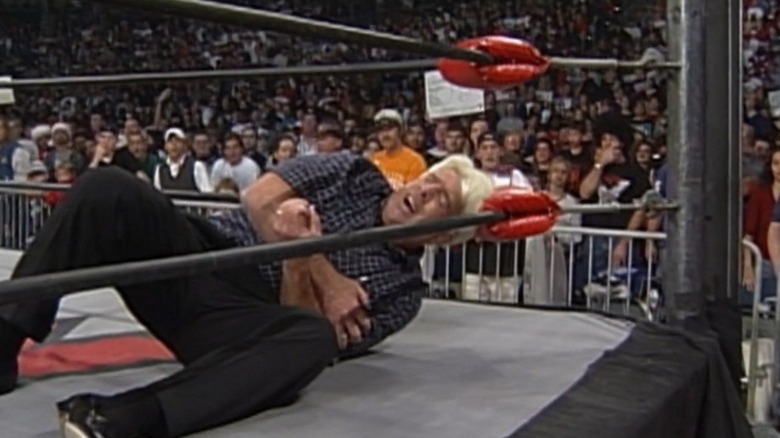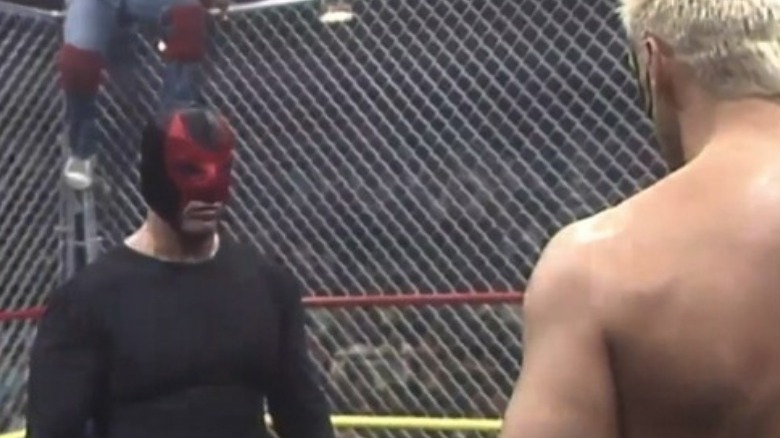Ric Flair Storylines In WCW That Made No Sense
On July 31, 2022, "The Nature Boy" Ric Flair competed in his last professional wrestling match (for now, at least). He teamed with Andrade El Idolo in a winning effort against Jay Lethal and Jeff Jarrett, closing out his career with as good a match as one would expect from a 73-year-old man who is far from the prime of his life. Nevertheless, it was a historic event that thrust Flair back into the forefront of the wrestling world one more time, giving fans every reason to go back and check out his prior, and far more impressive, in-ring work.
In the decades following his 1972 debut, Ric Flair traveled the world to become one of the greatest professional wrestlers of all-time. From the WWF — later WWE — to New Japan Pro-Wrestling, and even Impact Wrestling, if there was a ring set up somewhere, Flair would be more than willing to put on a show. That couldn't be more true than in the case of Jim Crockett Promotions and World Championship Wrestling, where he really picked up steam as one of wrestling's biggest stars throughout the closing years of the 20th century.
At the same time, for as fondly as Ric Flair's time in WCW can be looked back on, it wasn't perfect. In fact, the stylin,' profilin,' jet-flyin,' limousine-ridin,' kiss-stealin,' wheelin,' and dealin' son-of-a-gun had to endure some pretty rough storylines in his day. These ones in particular just didn't make any sense.
The unresolved Magnificent Seven storyline
Throughout his time as an active competitor, Ric Flair aligned himself with a few truly incredible factions. First and foremost was the Four Horsemen, which went through various incarnations following its initial formation in 1985. In his second WWE run, he famously joined Triple H, Randy Orton, and Batista to create Evolution: a stable that showed off the very best the past, present, and future of wrestling had to offer. In between the creation of the Horsemen and Evolution, The Dirtiest Player in the Game led another faction known as the Magnificent Seven, which caused some slight commotion in WCW during its final days.
Comprised of Ric Flair, Scott Steiner, Lex Luger, Rick Steiner, Buff Bagwell, Jeff Jarrett, and Road Warrior Animal, the Magnificent Seven formed at the WCW Sin pay-per-view event in January 2001. In the weeks that followed, the team went after the likes of Kevin Nash and Diamond Dallas Page while maintaining possession of the WCW World Heavyweight and United States Championships. Despite giving some all-time greats a run for their money and hanging tightly onto their championship gold, the Magnificent Seven didn't amount to much seeing as next to no one remembers the team all these years later.
By March 2001, the Magnificent Seven quietly disbanded, meaning it was only active for around two months. The WWF purchased WCW, resulting in all of the company's ongoing storylines ending before their time. Given the talent involved, the Magnificent Seven had a lot of potential, but sadly we'll never know how the story of this oft-forgotten coalition was supposed to end. Thus, we're stuck with a fraction of a storyline that doesn't make much sense due to its lack of a proper resolution.
Flair's rekindled rivalry with Dusty Rhodes in 2001
As one of professional wrestling's greatest heels, Ric Flair found himself at odds with some of the greatest babyfaces throughout his illustrious career. Among Ric Flair's most memorable opponents is "The American Dream" Dusty Rhodes, who put on some incredible bouts and dueling promos with The Nature Boy throughout the 1980s. Of course, as the 1990s began, the two WCW staples put some professional distance between themselves. That's not to say that their feud was over and done, but, considering what we got in 2001, it's fair to wish that it ended long before this point.
What began as a rivalry between Magnificent Seven member Jeff Jarrett and Dusty Rhodes soon morphed to feature The American Dream's son Dustin and Ric Flair. After some back and forth between the two sides, the feud culminated in a tag match at WCW Greed in March 2001. Flair — clad in a button-down shirt and slacks — and Jarrett faced the father-son Rhodes team, with the losers agreeing to kiss the rear end of one of the winners. The Rhodes team won, but when the time came to pucker up, Dusty revealed that Flair and Jarrett had to kiss the backside of his pet donkey.
While it was great to see The Dirtiest Player in the Game and The American Dream feud one more time and clash at the last WCW pay-per-view, this rivalry didn't make much sense. Sure, Dusty and Jarrett were already at odds and having Flair take part as a fellow Magnificent Seven member felt natural, but why add a hindquarters-kissing stipulation to a match featuring two of WCW's all-time greats? Even in this era, it was hokey and below them, hence why this poorly-devised chapter of their otherwise solid feud is better off forgotten.
His complicated storyline with his son, David Flair
Throughout the 2010s, Ric Flair's real-life daughter, Charlotte Flair, built her reputation as one of the most skilled and recognizable female wrestlers of her generation. Bearing in mind her success, it's easy to forget that she's not the only child of The Nature Boy to try their hand at the career path their father has found so much success in. Back in 1999, WCW fans met David Flair, and, in no time at all, it became abundantly clear that in-ring and microphone skills aren't genetically passed down from generation to generation.
Despite being incredibly green in the ring and timid on the mic, David Flair teamed with his father against Barry Windham and Curt Hennig at Souled Out in January 1999. He and his dad narrowly picked up the win, and, after doing so, they were assaulted by the New World Order. Nevertheless, a month later, David turned on his father to join the NWO before disappearing from WCW television to train. When he reemerged in May, he made amends with his father and went on to become a WCW United States and WCW World Tag Team champion (with Crowbar). Even though nepotism was getting him far, David yet again betrayed his father in the spring of 2000, and they wrestled against each other at that year's Great American Bash.
If done right, a real-life father-son storyline can turn out great and benefit all involved. The case of Ric and David Flair's story is not one of these instances. The inconsistent booking, David not being ready for such a huge spotlight, and WCW's narrative woes across the board during this period all combined to create a senseless, unentertaining story.
The Nature Boy goes into a psychiatric hospital
After spending numerous years as one of WCW's in-ring cornerstones, Ric Flair got quite an impressive on-screen promotion in late 1998. With the defeat of Eric Bischoff, The Nature Boy secured the title of WCW President — a job title he solidified with a subsequent victory over Hulk Hogan. One might imagine that WCW under Flair's watchful eye would look tame in comparison to the Bischoff era, potentially with him attempting to get the promotion under control after years of NWO domination. In reality, little changed, except for how The Dirtiest Player in the Game conducted himself.
It seemed that the status of WCW President sent Ric Flair over the edge in short order. When he'd appear on television, he'd ramble, rant, and rave more than usual, often tearing off his clothes during these strange fits. Concerned about his friend and the state of WCW, "Rowdy" Roddy Piper sought to save Flair from himself in a match at Slamboree 1999. Piper defeated Flair and became the new WCW President — only for The Nature Boy to regain the job shortly thereafter. This entire storyline is best remembered for one segment where Flair is sent to a psychiatric hospital. If you've never seen it, it's every bit as strange and poorly-aged as you would expect.
Ric Flair is one of those talents who can make nearly everything work, regardless of how goofy or weird it may seem. This is one example where even The Nature Boy stumbled a bit. His run-on promos and flippant attitude toward firing people may have been entertaining to watch, but the very concept of Flair losing his mind was a bit far-fetched, especially given how vague the rationale behind his sudden personality change was.
The 1998 heart attack
As we've seen on this list so far, the late 1990s into the early 2000s was not a great time for Ric Flair. He was handed one terrible, confusing storyline after the other, and only barely walked away from it all with his legacy intact. To make matters worse, he'd get the odd storyline that was in poor taste, such as the aforementioned psychiatric hospital example. Sadly, that wasn't the only narrative The Nature Boy found himself in where he'd have to go on national television and make a fool of himself in a way that most today would agree is more than a bit much.
On the December 14, 1998 edition of "WCW Monday Nitro," Ric Flair made his way to the ring to cut a scathing promo on real-life rival Eric Bischoff ahead of their match at Starrcade. He got pretty worked up, as he often did in front of the microphone, but this time it was different. All of a sudden, Flair walked over to the corner and slowly sat down, gripping his chest with a look of concern on his face. Medical personnel, Dusty Rhodes, Four Horsemen member Arn Anderson, and more checked on him, and it was confirmed that he suffered a heart attack. Tony Schiavone acted as if this was all real via commentary as fans looked on mortified.
We'd later learn that The Nature Boy was actually poisoned and didn't have a heart attack in the ring. In the aftermath, this whole story pretty much went nowhere as Flair resumed his feud with Eric Bischoff. It's impossible to deny that during this time, WCW was in a ratings battle to be the top wrestling promotion in North America. With that said, when it came to telling coherent stories with Flair, the minds behind it either couldn't or didn't care to crack the code.
The Black Scorpion
In the long, tumultuous history of WCW, a small handful of rivalries stand out as the absolute best of the best. Few would argue that Ric Flair versus Sting isn't among this elite class, seeing as the two wrestling legends put on several classics throughout their time across the ring from each other. Their feud wasn't short, having spanned from the late 1980s to the early 2010s, which comes with positives and negatives. The good thing is that many got to see Sting and Flair battle, with the bad being that, from time to time, the quality of their storylines would take a nosedive.
Easily the most infamous story involving The Stinger and The Dirtiest Player in the Game focused on an enigmatic character known as The Black Scorpion. It all started after The Nature Boy lost the National Wrestling Alliance World Heavyweight Championship to Sting at the 1990 Great American Bash. In the aftermath, a mysterious figure named The Black Scorpion taunted the new champion, claiming to be someone from Sting's past — specifically a former tag team partner — who desired his championship. The Black Scorpion even displayed supernatural abilities to intimidate Sting, but no matter what, he never backed down from this dangerous new foe.
It all culminated at Starrcade 1990, where Sting faced The Black Scorpion with the title on the line in a steel cage match. If the latter lost, he'd have to unmask. Sure enough, The Black Scorpion turned out to be Ric Flair. Forget the supernatural mind games, the supposed years upon years of history between them, and the fact that the likes of Barry Windham and Al Perez portrayed the character in weeks previous, it doesn't get much more disappointing and nonsensical than this.
